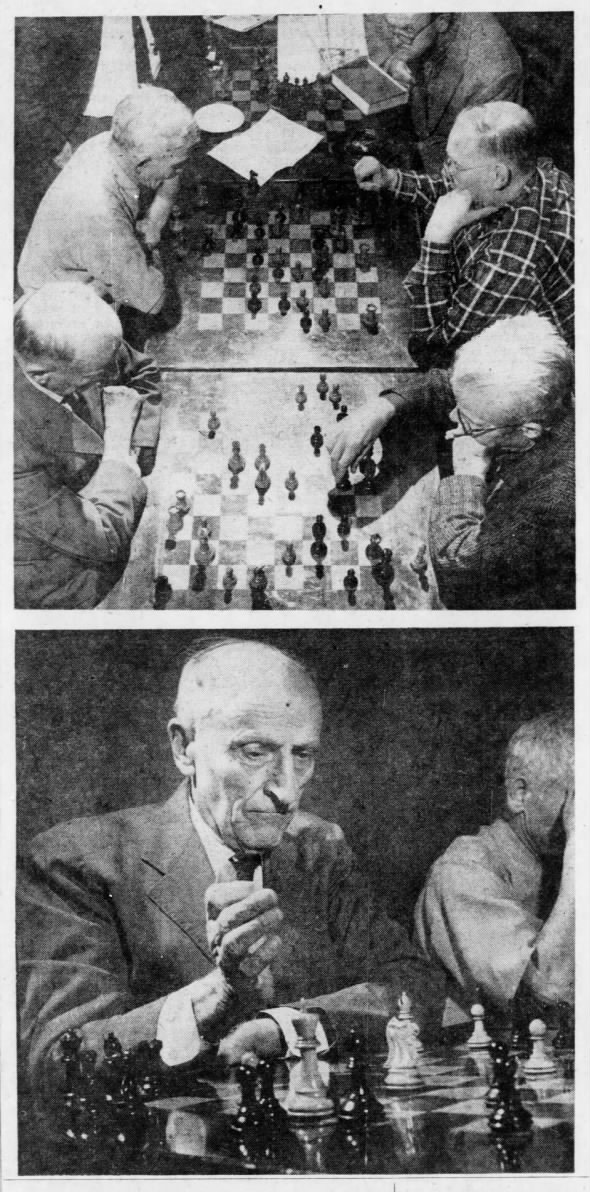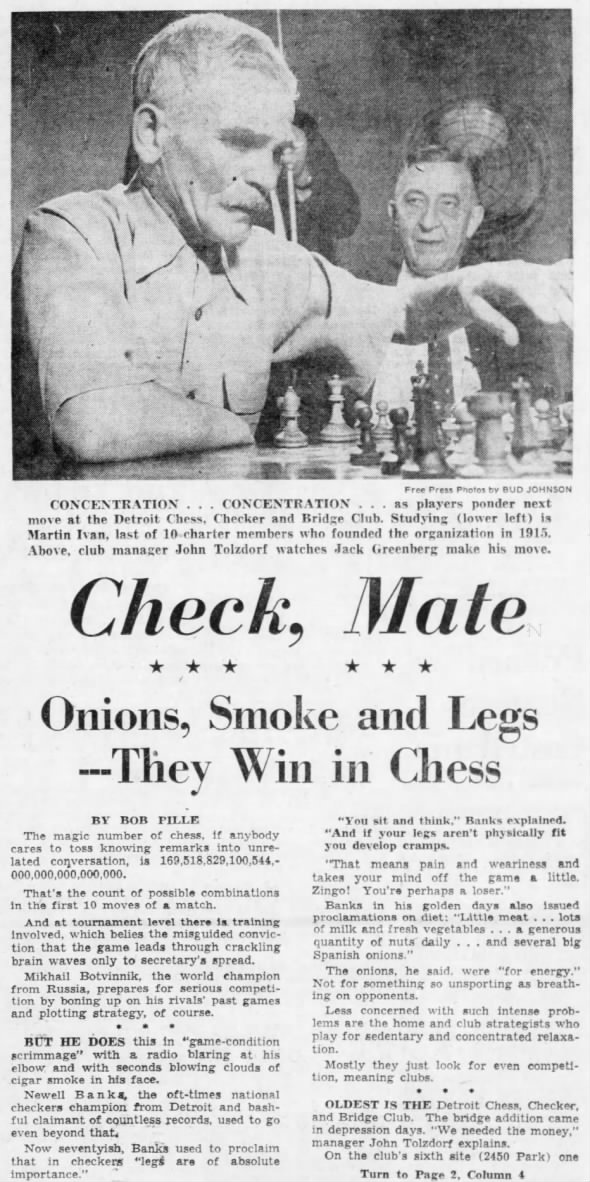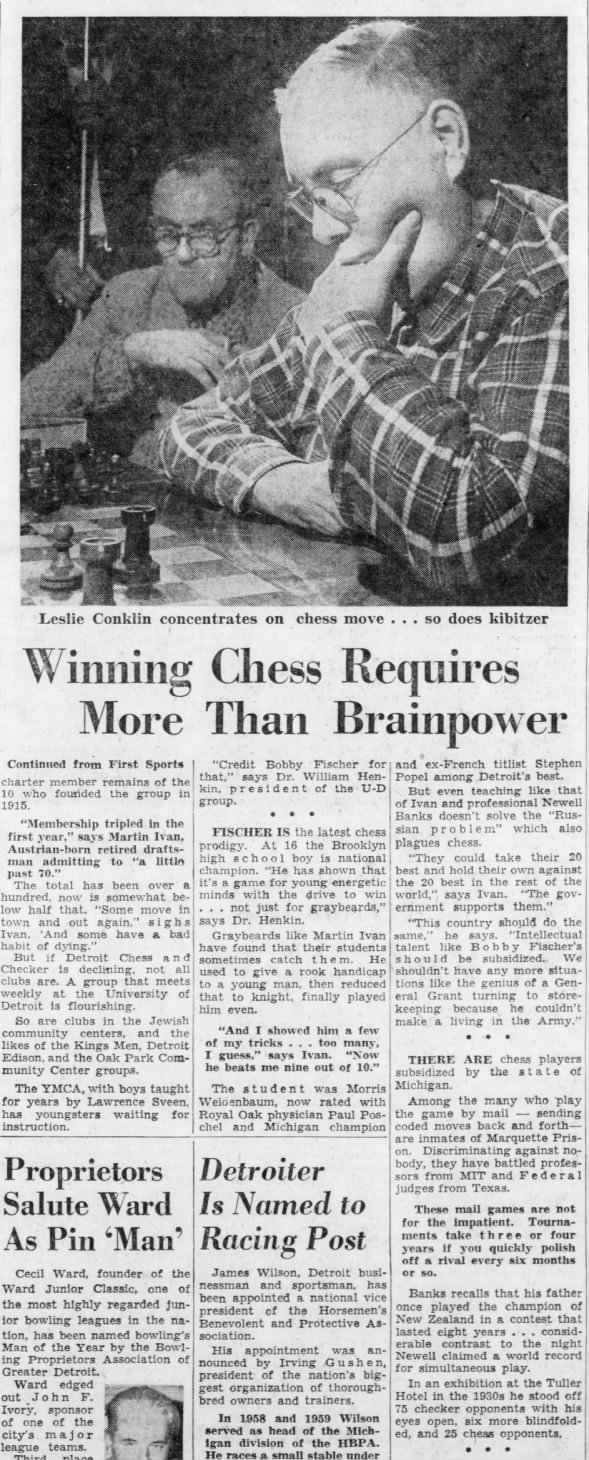Detroit Free Press, Detroit, Michigan, Sunday, January 03, 1960
 Check, Mate.. Onions, Smoke and Legs They Win in Chess 03 Jan 1960, Sun Detroit Free Press (Detroit, Michigan) Newspapers.com
Check, Mate.. Onions, Smoke and Legs They Win in Chess 03 Jan 1960, Sun Detroit Free Press (Detroit, Michigan) Newspapers.com
 Check, Mate.. Onions, Smoke and Legs They Win in Chess 03 Jan 1960, Sun Detroit Free Press (Detroit, Michigan) Newspapers.com
Check, Mate.. Onions, Smoke and Legs They Win in Chess 03 Jan 1960, Sun Detroit Free Press (Detroit, Michigan) Newspapers.com
 Winning Chess Requires More Than Brainpower 03 Jan 1960, Sun Detroit Free Press (Detroit, Michigan) Newspapers.com
Winning Chess Requires More Than Brainpower 03 Jan 1960, Sun Detroit Free Press (Detroit, Michigan) Newspapers.com
CONCENTRATION . . . CONCENTRATION . . . as players ponder next move at the Detroit Chess, Checker and Bridge Club. Studying (lower left) is Martin Ivan, last of 10 charter members who founded the organization in 1915. Above, club manager John Tolzdorf watches Jack Greenberg make his move.
Check, Mate
★ ★ ★ ★ ★ ★
Onions, Smoke and Legs —They Win in Chess
By Bob Pille
The magic number of chess, if anybody cares to toss knowing remarks into unrelated conversation, is 169,518,829,100,544,000,000,000,000,000.
That's the count of possible combinations in the first 10 moves of a match.
And at tournament level there is taining involved, which belies the misguided conviction that the game leads through crackling brain waves only to secretary's spread.
Mikhail Botvinnik, the world champion from Russia, prepares for serious competition by boning up on his rivals' past games and plotting strategy, of course.
★ ★ ★
BUT HE DOES this in “game-condition scrimmage” with a radio blaring at his elbow and with seconds blowing clouds of cigar smoke in his face.
Newell Banks, the oft-times national checkers champion from Detroit and bashful claimant of countless records, used to go even beyond that.
Now seventyish, Banks used to proclaim that in checkers “legs are of absolute importance.”
“You sit and think,” Banks explained, “And if your legs aren't physically fit you develop cramps.
“That means pain and weariness and takes your mind off the game a little. Zingo! You're perhaps a loser.”
Banks in his golden days also issued proclamations on diet: “Little meat…lots of milk and fresh vegetables…a generous quantity of nuts daily…and several big Spanish onions.”
The onions, he said were “for energy.” Not for something so unsporting as breathing on opponents.
Less concerned with such intense problems are the home and club strategists who play for sedentary and concentrated relaxation.
Mostly they just look for even competition, meaning clubs.
★ ★ ★
OLDEST IS THE Detroit Chess, Checker and Bridge Club. The bridge addition came in depression days. “We needed the money,” manager John Tolzdorf explains.
On the club's sixth site (2450 Park) one
Leslie Conklin concentrates on chess move . . . so does kibitzer.
Winning Chess Requires More Than Brainpower
Continued from First Sports
charter member remains of the 10 who founded the group in 1915.
“Membership tripled in the first year,” says Martin Ivan, Austrian-born retired draftsman admitting to “a little past 70.”
The total has been over a hundred, now is somewhat below half that. “Some move in town and out again.” sighs Ivan. ‘And some have a bad habit of dying.”
But if Detroit Chess and Checker is declining, not all clubs are. A group that meets weekly at the University of Detroit is flourishing.
So are clubs in the Jewish community centers, and the likes of the Kings Men, Detroit Edison, and the Oak Park Community Center groups.
The YMCA, with boys taught for years by Lawrence Sveen, has youngsters waiting for instruction.
“Credit Bobby Fischer for that,” says Dr. William Henkin, president of the U-D group.
★ ★ ★
FISCHER IS the latest chess prodigy. At 16 the Brooklyn high school boy is national champion. “He has shown that it's a game for young energetic minds with the drive to win … not just graybeards,” says Dr. Henkin.
Graybeards like Martin Ivan have found that their students sometimes catch them. He used to give a rook handicap to a young man, then reduced that to knight, finally played him even.
“And I showed him a few of my tricks … too many, I guess,” says Ivan. “Now he beats me nine out of 10.”
The student was Morris Weidenbaum, now rated with Royal Oak physician Paul Poschel and Michigan champion and ex-French titlist Stephen Popel among Detroit's best.
But even teaching like that of Ivan and professional Newell Banks doesn't solve the “Russian problem” which also plagues chess.
“They could take their 20 best and hold their own against the 20 best in the rest of the world,” says Ivan. “The government supports them.”
“This country should do the same,” he says. “Intellectual talent like Bobby Fischer's should be subsidized. We shouldn't have any more situations like the genius of a General Grant turning to storekeeping because he couldn't make a living in the Army.”
★ ★ ★
THERE ARE chess players subsidized by the state of Michigan.
Among the many who play the game by mail — sending coded moves back and forth — are inmates of Marquette Prison. Discriminating against nobody, they have battled professors from MIT and Federal judges from Texas.
These mail games are not for the impatient. Tournaments take three or four years if you quickly polish off a rival every six months or so.
Banks recalls that his father once played the champion of New Zealand in a contest that lasted eight years . . . considerable contrast to the night Newell claimed a world record for simultaneous play.
In an exhibition at the Tuller Hotel in the 1930s he stood off 75 checker opponents with his eyes open, six more blindfolded and 25 chess opponents.
★ ★ ★























